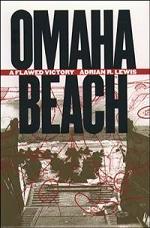
Omaha Beach: a Flawed Victory
Adrian R. Lewis
381 pages including index and notes
published in 2001
Omaha Beach: A Flawed Victory was not quite the book I expected it to be or wanted to read. What I thought I was getting out of the library was a book describing the landings itself, looking in detail at how the battle for Omaha Beach evolved, similar to a book on Kursk I got at the same time. What I got instead was an analysis of the strategic choices made for the landings and how that led to near-disaster at Omaha. The actual battle is dealt with in the first chapter, the rest of the book deals with the reasons why the battle happened as it did.
Any disappointment I felt was shortlived. The book I got was easily as interesting as the book I wanted to get. What it managed to do was to make me question the "official" reasons why the Americans at Omaha Beach did so much worse than their colleagues at Utah or the British/Commonwealth forces at their landings. What I've always read was that the American commanders at Omaha had both underestimated the German resistance and the German fortification and had rejected the use of all the various special enginering tanks the British had developed to tackle these fortifications, the socalled "Hobart's Funnies". What Adrian R. Lewis argues instead was that the real problem was that the Normandy Landings were planned according to the wrong doctrine, that the experience build up in earlier landings in the Pacific and the Mediterranean was ignored in favour of finding new solutions to the same problems because the commanders in charge of Operation Overlord overestimated the uniqueness of the operation.
Lewis explains the differences in doctrine between the British and Americans. The first developed their ideas on amphibious operations through their experiences in the Mediterranean theatre, not to mention the disaster that was Dieppe. This taught them that a frontal assault was likely to fail and overwhelming firepower was not a substitute for gaining strategic, tactical and/or operational surprise. They therefore developed a amphibious doctrine, largely written by Montgomery, that emphasised operations on the periphery, preferably taking place at night to gain tactical surprise.
The Americans meanwhile had developed their doctrine in the Pacific, where their experiences taught that that enough firepower could overwhelm fixed defences at the water's edge, while surprise was no replacement for firepower. The Marine Corps therefore developed a doctrine which emphasised massive shore bombardments before landings, taking hours or even days.
Omaha Beach: a Flawed Victory argues that the tactics chosen for the Normandy Landings combined these two doctrines to the detriment of both. To achieve tactical surprise the attack should've started much earlier than it did, while the time available for bombardment was too little to do much good. Which meant that the enemy was on the alert but largely unharmed by the time the soldiers landed.
There was also the decision to replace a proper shore bombardment with air attacks, using strategic bombers to destroy fortifications. But the airforce was uninterested in this role and only grudgingly allocated planes for it and never took much trouble to train for it, while coordination with the army was almost non-existent. Which inevitably meant that the aerial bombardments did little to hamper the Germans' defence efforts on Omaha Beach.
Omaha Beach: a Flawed Victory was interesting, but I'm not sure how valid Lewis' argument is. I need to read and learn more about the Normandy Landings to be able to evaluate his thesis.